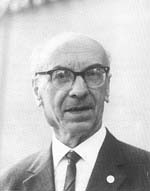Shin Buddhism in Germany

Despite the fact that German Shin Buddhism is until now one of the smaller communities within the German Buddhism, it can already look back on more than sixty years of history. Originally founded in Berlin the most important centre is nowadays the Buddhist centre Anjin-dō in Mönchengladbach.
A special enrichment has been the establishment of the EKO temple in Düsseldorf. Although this temple, which is as a part of the Japanese-German culture centre also a local sight, is planned as an oasis for all Buddhists, the equipping of the temple is in all its details typical for the Jōdo Shinshū Hongwanji-ha, and the two resident Japanese priests also belong to this denomination.
Worth to mention as a pioneer of German and European Shin Buddhism is Rev. Harry Pieper (1907-1978), who is held in high esteem even in Japan. Born in Berlin he joined in his young years the Buddhist House in Frohnau (Berlin), which had been founded by Dr. Paul Dahlke and promoted the Theravada tradition. From 1930 to 1934 (another source says 1938) he was its head, afterwards all Buddhists activities were forbidden by the Gestapo (Nazi Germany’s secret police). In the following years Harry Pieper met with his group to conspirative Dharma gatherings in the attic story of a Berlin rented flat. An artistically talented member drawed a picture of the Buddha with chalk on the wall and Harry Pieper recited the texts of the Pāli Kanon by heart.
After he had returned from Russian capitivity in 1946, he founded the “Buddhist Mission”, which opened up to the Mahāyāna Buddhism. In this time he became member of the Arya Maitreya Mandala, an Tibetan order founded by Lama Angarika Govinda.
Since 1954 he had contact to the physics professor and convinced Shin Buddhist Osama Yamada, who introduced him step by step into the Shin Buddhist teachings. Still in the same year he met the then Monshu, H.E. Kōshō Ōtani, and impressed by his personality and way of dharma teaching Harry Pieper decided to enter the Pure Land Way.
Soon Harry Pieper made use of his many years of experience with organization and work for Buddhist associations. At January 16th 1956 he founded the “Buddhistische Gemeinschaft Jōdo Shinshū” (Buddhist Association Jōdo Shinshū). In quick succession followed his most important translations into German: Kōshō Ōtani’s: “The faith of Jodo Shinshu”. Ryuichi Fujii’s: “The true meaning of Buddhism”, Kyōto 1957 “Buddhist Religion”, Kyōto 1958 etc.
In the early sixties Harry Pieper received the ordination to the Shin Buddhist priesthood. Until the end of his life he tried hard to transmit Shin Buddhism to Europe, and many of the most important personalities of Europeas Shin Buddhism are his direct or indirect disciples, f.e. Jean Eracle, the founder of the sangha in Geneve.
In his private life Harry Pieper worked as interpreter especially for the members of American and British armed forces in the devided city. He was married and had two daughters. Buddhism was for him a matter of daily life, not a matter of big talks and nice resolutions. A friend and companion of Harry Pieper, Valentin von Maltzan, characterized him in his eulogy with the words: “His simplicity did not arise from ignorance. He possessed a knowledge of Buddhism. He had, like many Europeans, to find his way among the diversities of Buddhist teachings and doctrines. For him Shin Buddhism was not the supreme among the various paths. Shin Buddhism was simply the right one for him and when he had found it he looked not further.”